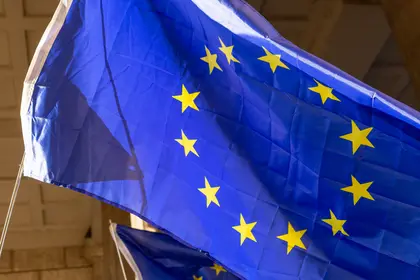Ukranians will still need to apply for ETIAS to travel to Schengen Area countries once the travel authorization is launched in 2023. This is despite the fact that President Zelensky officially signed an European Union membership application on 28 February 2022 during the first stage of the Russian invasion.
The application has since received enthusiastic support from several European Union leaders, most recently from German Chancellor Olaf Scholz. European Commission President Ursula von der Leyen has also said that Ukraine is "one of us and we want them in" the EU.
JOIN US ON TELEGRAM
Follow our coverage of the war on the @Kyivpost_official.
However, according to the Union’s own website, "becoming a member of the EU is a complex procedure which does not happen overnight". This means that Ukrainaians will not gain EU membership before November 2023 when ETIAS will come into effect.
It’s also important to note that despite the European Union’s green light on Ukraine’s application, the country is not in fact a part of the Schengen Area for passport-free travel. This means that Ukrainians will need to obtain an ETIAS travel authorization to go to a Schengen country once it is implemented.
ETIAS stands for "European Travel Information and Authorization System." It's a European travel authorization for non-Schengen citizens that was first proposed in 2018 as part of an effort by the European Union (EU) to increase security while allowing third-country nationals to cross external borders.

Ukraine Moves Forward with Draft Multiple Citizenship Law: Ukrainian World Congress Responds
The system is similar in many ways to ESTA, the U.S. electronic system that allows visa-exempt foreign citizens traveling to the United States to obtain permission from U.S authorities before they go on their trip.
The EU claims it will help improve security and decrease immigration fraud by requiring visa-exempt visitors from outside the Schengen Area to apply online at least three days before they travel. to strengthen security at EU borders
They will be required to provide basic information about themselves such as name and date of birth, answer some questions about their health and criminal history, pay a processing fee, then wait up to 72 hours while their application is vetted.
There are still some details left unanswered, but we do know that those who don't have ETIAS visa waivers will be denied entry at the Schengen Area’s external borders once the system is fully implemented.
Ukranians have been able to travel to Schengen Area countries without a visa since 2017, simply by presenting a valid passport at border checkpoints. Visa-free entry for Ukrainians is granted for purposes of tourism, business, short-term study, transit, or medical treatment.
Citizens of Ukraine are permitted a visa-exempt stay of up to 90 days within every 180-day period. Ukraine will continue to enjoy visa-free entry into Schengen member states for the same period of time and travel purposes.
However, ETIAS will apply to Ukrainians and they will have to obtain the online authorization first in order to do so.
Nevertheless, it will not be necessary to apply for ETIAS before every trip to the Schengen Area. ETIAS is valid for a total of 3 years from the date of approval, or until the associated passport expires, and allows multiple entries during its validity.
The EU’s current policy on accepting refugees from Ukraine is due to expire on 4 March 2023. Temporary protection in the European Union is currently being offered to Ukrainian nationals and their family members who left to escape war from February 24 2022 onwards.
The policy also extends to stateless persons and nationals of other third countries who benefited from international protection or equivalent protection in Ukraine before 24 February 2022, as well as their family members.
Those residing in Ukraine before 24 February 2022 on the basis of a valid permanent residence permit, and who cannot return in safe and durable conditions to their country of origin, are also eligible for the scheme, depending on the EU country they are in.
Although temporary protection is only initially granted for one year, the EU has said this may be extended depending on how the situation in Ukraine develops.
Ukrainian refugees accepted into the EU under the Temporary Protection Directive are granted rights including a residence permit, access to housing and the labor market, and the ability to open a basic bank account. Rights to medical assistance and access to education for children are also guaranteed under the program.
If a Ukrainian is granted temporary protection, the rights deriving from the status are only guaranteed in the EU country that issued the residence permit. However, they still have the right to travel to other countries within the EU for 90 days within a 180-day period.
If they decide they wish to benefit from their rights in a different EU country and obtain a resident permit for that member state, they have to give up the first permit and renounce their rights in the country of their initial residency.
You can also highlight the text and press Ctrl + Enter







